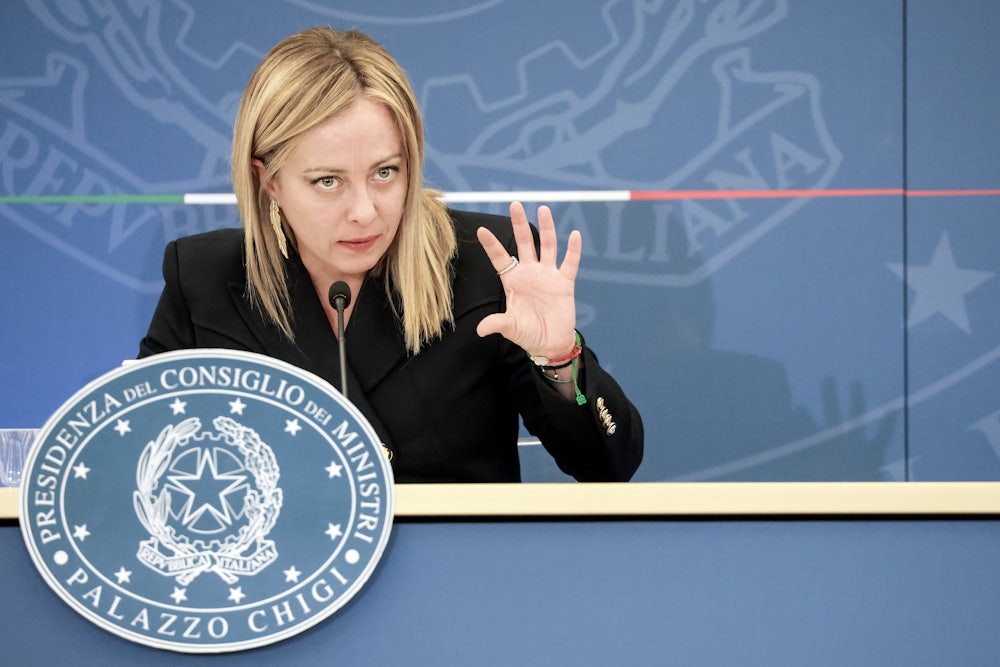Weeks before Italy elected its first far-right government since the end of World War II, an official from one of the coalition parties filmed himself approaching a woman on the street in Florence, flashing a villainous grin for the camera as he said, “Vote for the Lega to never see her again.”
The official, Alessio di Giulio of the Lega Nord, knew nothing about the woman, with two exceptions. First, her appearance and traditional clothing marked her as a member of the Roma, Europe’s largest ethnic minority. Second, he knew he could score political points by calling for her people’s ethnic cleansing. The video sparked a nationwide backlash, including criticism from Lega Nord leader Matteo Salvini. Di Giulio rushed to defend himself with the well-worn tactic of claiming he wasn’t racist because his girlfriend is Nigerian.
But di Giulio’s stunt and the insincerity of Salvini’s criticism expose how hollow the new government’s attempts to assuage concerns that its rise signals fascism’s return to Italy really are. It illuminates how anti-Roma racism pervades European society and animates fascist movements. It’s a serious problem that demands closer public and media scrutiny, particularly as it contrasts sharply with the perception of Europe as a bastion of social progress.
The September 25 election handed power to a coalition comprising the Lega Nord, former Prime Minister Silvio Berlusconi’s Forza Italia, and Fratelli d’Italia, a party with fascist roots whose leader, Giorgia Meloni, was sworn in as prime minister on October 22, with Salvini becoming deputy prime minister and minister of infrastructure. Neither the parties nor Meloni’s government responded to requests for comment.
But in August, Meloni attempted to reassure people that her victory would not revive some of the darkest chapters of Italy’s past. “The Italian right has handed fascism over to history for decades now, unambiguously condemning the suppression of democracy and the ignominious anti-Jewish laws,” Meloni said in a prerecorded video, referring to Mussolini’s persecution of Italian Jews during his alliance with Nazi Germany, leading to the murder of some 7,680 during the Holocaust.
Louder than Meloni’s attempt to disassociate her coalition from Mussolini’s antisemitism, however, was her silence on Il Duce’s persecution and murder of Roma through a series of deportations and ethnic cleansings, starting with foreign-born Roma in 1926.
English-language media largely took at face value Salvini’s rebuke of di Giulio; he said that his colleague was “wrong” and “made a fool of himself.” But most didn’t report subsequent remarks making it obvious that the bad publicity troubled Salvini more than the racism. “As interior minister, I cleared Roma camps by enforcing the law,” he boasted to Italian TV outlet SkyTg24, referring to his time in that position from 2018 to 2019, despite di Giulio’s video not mentioning the camps.
Salvini then, in response to a journalist urging him to criticize di Giulio more strongly, added a dig at the leader of a rival center-left party: “How I hope [Enrico] Letta is severe with the antisemitic candidates with which he filled the lists of the [Partito Democratico].”
Salvini’s facile use of partisan whataboutism to deflect criticism, as well as his cynical claims to have been “enforcing the law” in targeting the Roma people, should discredit any notion that the new governing coalition has, as Meloni said, “handed fascism over to history.”
As interior minister, Salvini made a spectacle of demolishing Romani people’s homes in “nomad camps,” so called even though most of their residents originate from longtime settled communities. As if in tribute to Mussolini, he proposed a “census” of Roma and expulsion of those of foreign origin lacking valid documents. He claimed his actions were only meant to put “Italians first” and were not racially motivated, but that was exposed as a lie after he said of Italian Roma on a talk show, “Unfortunately, we have to keep them because we can’t deport them.”
Salvini may be the coalition’s most visible bigot, but his partners are far from innocent. Meloni, an adherent to the antisemitic “white replacement” conspiracy theory, has blown a fair share of racist dog whistles, most notably her characterization of the center-left Five Star Movement as “the party of the nomads.” Berlusconi’s government declared a “nomad emergency” in 2008 and planned to fingerprint all Roma, including children.
Meloni and company are hardly the first in Europe to put their best jackbooted foot forward for political gain. Hungary’s once openly antisemitic and anti-Roma Jobbik party did the same when it realized the limits to using anti-Roma campaigning if it wanted to win enough votes to govern instead of remaining an opposition party. But it still drew eye rolls in 2016 when it wished Budapest’s Jewish community a happy Hanukkah. Autocratic Hungarian Prime Minister Viktor Orbán, who has become a darling of the U.S. right, has his own grotesque history of attacks on Roma as well.
Željko Jovanović, director of Roma initiatives for the Open Society Foundations, likewise isn’t buying the Meloni coalition’s cleaned-up image and doesn’t have high hopes that the already dire situation for Roma in Italy—which even center-left parties had done little to ameliorate—will improve anytime soon. Meloni may not feel the political need to launch attacks against the Roma now, but that could change should her political fortunes ebb.
“I would not exclude the possibility that if she starts feeling that she’s losing power, that she needs more votes, she might,” he said. “Maybe not directly—maybe some of the fascist, far-right elements in the party could do that.”
Salvini’s exploitation of the “nomad camps” issue illustrates how politicians scapegoat Roma, particularly as the issue itself arose from a government policy of moving Roma into public housing projects. “What they then did was completely neglect them for the next 15 to 20 years, to the point where most of them now are overcrowded; they have limited access to water, not great electricity,” said Jonathan Lee, advocacy and communications director for the Brussels-based European Roma Rights Centre, who explained how the Roma are subject to a “continuous cycle of eviction and re-eviction.”
As the housing projects—lacking garbage collection, reliable utilities, and access to jobs or public transit—become a problem, authorities evict residents but don’t offer viable alternatives, leaving people with nowhere to go. “So they’ll go and build a shack somewhere else and then maybe three weeks, maybe nine months later, they’ll be evicted from there,” Lee said. Politicians like Salvini could address the poverty, societal exclusion, racial discrimination, and failed policies affecting Roma, but it’s easier and more attractive to make political hay blaming Roma themselves for problems that racist leaders like him help create.
Lee said a particular danger with the new government is that it brings a return of the kind of unfiltered hate speech that characterized Salvini’s previous ministerial term and which encourages violent far-right street movements. “That was something that really reared its head during the last Salvini coalition, where we had mobs of people outside places where Roma were living,” Lee said. “In 2019, there were teenagers in Naples throwing stones at a Romani mother and her children, threatening to stab them; that same year, a Romani mother and her baby had to be escorted by police and out of a new social housing because a far-right mob was screaming threats of rape and murder at her.”
This animosity is not new by any means; it’s a legacy of the racism Roma have faced since they arrived in Europe from India around the twelfth century and moved across the continent, splitting into diverse groups like the Vlax of Romania, the Romanichals of Britain, and the Sinti of Central Europe. In Romania, the Roma were enslaved and prevented from settling in other parts of Europe, forcing them into nomadism. The term Gypsy came to be applied to the Roma, stemming from the mistaken belief they were Egyptian. Particularly in the U.S., gypsy became a shorthand for someone with a free-spirited lifestyle or personality rather than an ethnicity—the term has been frequently misused in popular culture. Today that term is considered pejorative; equivalent terms in Central, Southern and Eastern European languages, derived from the Greek atsiganoi, are highly derogatory as well.
Centuries of persecution and exclusion peaked during the Holocaust, when Nazis and their allies slaughtered somewhere between 500,000 and 1.5 million Roma. Estimates vary so widely because these murders often went unrecorded or because victims lacked census records. Still, many nations recorded losses exceeding 80 percent of the local population during this period of time. In fact, one of the most hauntingly iconic images of the Holocaust—the young girl in the head scarf gazing forlornly from a train car—depicts not a Jewish girl but Settela Steinbach, a Sinti who was gassed at Auschwitz at age 9.
Media and educational campaigns concerning the Holocaust frequently minimize or fail to mention Romani victims, so that the common association between fascism and antisemitism does not often extend to anti-Roma hatred.
“If we had the same weight placed on the Holocaust as it affected Roma and Sinti, then it would be harder for people to get away with rhetoric that minimizes present-day fascist ideologies as they affect Roma and Sinti,” said Petra Gelbart, an ethnomusicologist at Fordham University and granddaughter of Romani Holocaust survivors. “But we have very little weight put on the commemoration and education regarding the Romani experience in the Holocaust, and so people don’t have that automatic reaction that I think people on all points of the political spectrum will have—when you say the word ‘fascist,’ and you think of Jews.”
One example of that minimization is found in the new PBS documentary series The U.S. and the Holocaust. In the second episode, it mentions Romani victims only after Poles, who were largely political prisoners, and Russians, largely prisoners of war, before going on to discuss Jehovah’s Witnesses at length. Although the series’s main focus was on Jewish victims, listing Romani victims in such a way obscures the fact that the Nazis explicitly targeted them, alongside Jews, for extermination on racial grounds.
This pattern of overlooking Romani victims started almost as soon as the Holocaust ended. Allied authorities in Germany characterized Roma not as victims of a racially motivated genocide but as criminals, socialists, and work-shy. West Germany only officially recognized the Roma genocide in 1982. While Jewish survivors were called to testify at the Nuremberg Trials, Romani survivors were not, in part because although Jews tended to occupy more middle-class positions in society before and after the Holocaust, the Romani middle class was virtually wiped out.
“Middle-class Roma were the easiest to find and the easiest to kill, so when it came to these trials after the Holocaust, there were no Roma to testify—there was no one to present evidence of this ethnic character of the Holocaust,” Lee said. “Unlike for Jews in Europe, there was no watershed moment here where this changed everything and started a path toward the at least surface taboo for antisemitism.”
Antisemitism has understandably stood at the forefront of the beliefs of Europe’s fascists, especially given the fact that elaborate conspiracies demonizing the Jewish people are central to the mythos of these far-right political movements. But anti-Roma racism also plays a sizable role. While demonizing Roma for political gain is less likely to earn right-wing candidates as severe a backlash, it nevertheless illuminates their mindset: “It doesn’t inform their ideologies, but it does inform their policies,” Lee said.
Ideologically, Lee said, European fascists tend to regard Jews, Muslims, and LGBTQ people as greater threats. But hatred toward Roma is more pervasive in society overall and cuts across the political spectrum. “It’s a much more embedded, societal, almost pure hatred; that we are a nuisance, this sort of textbook hate speech comparing to insects or rats or parasites or something that drags the nation down but isn’t necessarily a threat to it,” Lee said. Even European Union funding earmarked for Roma inclusion goes unused for fear of political backlash. “The easiest way to gain cheap votes at the ballot box is to be seen to be tough on ‘Gypsies,’” Lee said. “The easiest way to lose votes is to be soft on ‘Gypsies.’”
Among the most harmful stereotypes is the association in the popular imagination of Roma with criminality, stereotypes that have even made it to the United States. In February, police in Kansas City, Missouri, canceled a training on “Criminal Gypsies/Travelers” amid public criticism. But among many Europeans, such attitudes go largely unquestioned. “It’s that kind of quote-unquote ‘common sense’ that [Roma] are liable to be parasites,” said Gelbart, who grew up in what is now the Czech Republic. There, many Romani men work in what she called the “gray market,” meaning in jobs such as construction where they are paid under the table, which leads to the false perception that they don’t work.
Gelbart said her son has been physically and verbally assaulted because of his race multiple times in Europe, and the idea that Roma are genetically inferior informs many written and unwritten policies against them. “I’ve seen that on the ground in ways that I think are surprising to people who haven’t walked in those circles, so I’m talking doctors, nurses, and especially social workers,” she said, adding that it’s “not a minority view” among Czech and Slovak social workers that socioeconomic issues among Roma have genetic origins.
Police brutality against Roma—usually in the form of beatings and torture but also fatal shootings—and collective punishment of Romani communities is also rife. Days after Italy’s election, police in Sassari, Sardinia, raided a Roma camp on designated municipal land over alleged illegal waste dealing by several of its members, seizing land that the local government said would have “great value, once cleaned” for development and promising “housing solutions” for those evicted. In June, a disabled Romani man in Rome “fell” nine stories from his bedroom window and ended up in a coma during an unauthorized police raid on his apartment.
Like di Giulio’s harassment of the Romani woman in Florence, incidents like these remain largely invisible to the tens of millions of tourists who flock to Italy each year. But as the far right takes power in Italy and threatens to expand its influence in Europe, perhaps we all should start paying closer attention: Threats to Roma, already morally outrageous, should warn of a larger fascist threat too.










